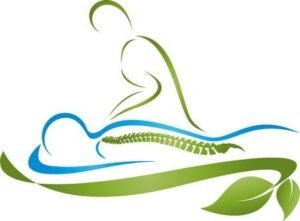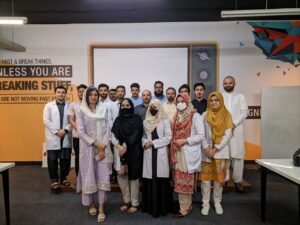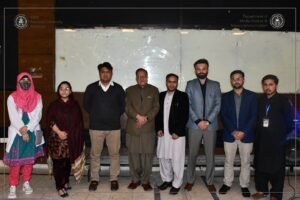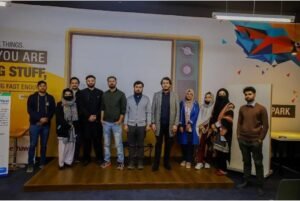Welcome to the captivating world of physiotherapy! HealthNest, a leading provider of online services and consultations for physical health and physiotherapy, recently organized a remarkable two-day workshop on the fundamentals of the Maitland Concept. Held at the prestigious National Incubation Centre in the vibrant city of Peshawar, Khyber-Pakhtunkhwa, Pakistan, this workshop brought together enthusiastic students and experts in the field. Join us as we dive into the highlights and invaluable insights gained during this enlightening event.
Day 1:
Understanding the Maitland Concept The workshop kicked off with an invigorating introduction to the Maitland Concept, a renowned approach to manual therapy developed by Geoffrey Maitland. Participants eagerly absorbed the essence of this hands-on technique, focusing on the assessment, evaluation, and treatment of musculoskeletal disorders. The facilitators, distinguished experts in the field named Dr. Umar Khan (PT) guided students through theoretical discussions, case studies, and practical demonstrations, ensuring a comprehensive understanding of the concept.
Key Takeaways:
- The workshop commenced with an enlightening introduction to the Maitland Concept, a renowned approach to manual therapy developed by Geoffrey Maitland. Participants were introduced to the core principles and philosophy that underpin this concept, emphasizing the importance of individualized patient care and evidence-based practice. They gained a deeper understanding of how the Maitland Concept can effectively address musculoskeletal dysfunctions and optimize patient outcomes.
- One of the key areas covered during the workshop was an in-depth exploration of mobilization techniques. Students were introduced to a variety of mobilization techniques, including oscillatory and sustained techniques, and learned how to apply them to different joints in the body. Through practical demonstrations and hands-on practice, participants acquired the skills necessary to perform mobilization techniques safely and effectively.
- Subjective examination, a crucial aspect of patient assessment, was given significant attention during the workshop. Students learned how to gather pertinent information from patients through detailed questioning and active listening. By honing their communication skills, participants were able to extract valuable information regarding patients’ symptoms, functional limitations, and medical history, enabling them to develop accurate diagnosis and treatment plans.
- The workshop provided a comprehensive understanding of the theory and principles behind joint mobilization. Participants delved into the physiological and biomechanical aspects of joint mobilization, gaining insights into how these techniques can improve joint mobility, reduce pain, and enhance overall function. This theoretical knowledge served as a solid foundation for the practical application of joint mobilization techniques.
- Grading, an essential aspect of joint mobilization, was thoroughly discussed during the workshop. Students were introduced to the different grades of mobilization, ranging from small-amplitude oscillations to larger-amplitude manipulations. They learned how to select the appropriate grade based on the patient’s response and treatment goals, ensuring a tailored approach to patient care.
Day 2:
- Application and Case Studies Building upon the foundations laid during the first day, the second day of the workshop focused on the practical application of the Maitland Concept through immersive case studies. Participants were divided into small groups and given the opportunity to analyse and formulate treatment plans for complex scenarios under the guidance of experienced mentors.
Highlights:
- A highlight of the workshop was the demonstration and supervised practice of peripheral joint mobilization techniques. Under the guidance of experienced mentors, participants had the opportunity to observe these techniques being performed and then engage in hands-on practice. This interactive component allowed students to develop their skills in applying peripheral joint mobilization techniques accurately and confidently.
- Hands-On Experience: Working closely with mentors, participants had the chance to practice their newly acquired skills in a supportive environment. They learned how to apply the Maitland Concept’s principles to effectively address specific patient conditions, improving their confidence and competence as future physiotherapists.
- Professional Networking: HealthNest’s workshop brought together a diverse group of participants, creating a valuable networking opportunity for students. Interacting with experienced professionals and like-minded peers opened doors to potential future collaborations and mentorship.
Certificates of Achievement
As a testament to their hard work and dedication, the participants of the “Fundamentals of Maitland Concept” workshop were awarded certificates of achievement during the closing ceremony. These certificates recognized their active participation, commitment, and the valuable skills they acquired throughout the two-day event.















